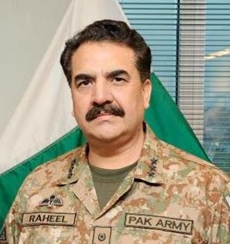Pak’s Raheel Sharif to head 39-member Islamic military alliance
07 Jan 2017
Pakistan's former army chief General (retd) Raheel Sharif, has been appointed as head of the 39 Islamic Countries alliance, Pakistan defence minister Khwaja Asif has said.
 Saudi Arabia announced in December the formation of the Islamic military alliance to combat terrorism.
Saudi Arabia announced in December the formation of the Islamic military alliance to combat terrorism.
The alliance will act to protect the nations from all armed groups and terrorist organisations - whatever their doctrine or title - which spread killing and corruption in the world and are designed to terrorise the innocent, Saudi Press Agency had earlier quoted a statement as saying about the objectives of the alliance.
Khwaja Asif told Geo television on Friday that an agreement on Raheel Sharif's appointment was reached a few days ago. However, no details of the agreement are available.
Raheel Sharif retired as Pakistan Army Chief in November 2016 after completing his three-year term. The Pakistani army conducted major operations against the armed groups under Raheel Sharif, the country's media reported.
The coalition consists of Saudi Arabia, Jordan, UAE, Pakistan, Bahrain, Bangladesh, Benin, Turkey, Chad, Togo, Tunisia, Djibouti, Senegal, Sudan, Sierra Leone, Somalia, Gabon, Guinea, Palestine, Comoros, Qatar, Cote d'Ivoire, Kuwait, Lebanon, Libya, the Maldives, Mali, Malaysia, Egypt, Morocco, Mauritania, Niger, Nigeria and Yemen.
The Pakistan government and the army top brass had given their consent for the appointment as retired officers can take up such assignments within two years of stepping down only with the government's assent, he said.
''Our government's say was involved in it, he couldn't have done this independently. All the clearances were taken,'' Asif said. ''This was in the pipeline for quite some time and the prime minister was also part of the deliberations.''
Asif described the military alliance as a ''good thing'' saying the ''Ummah'' (Muslim brotherhood) requires unity to tackle problems in ''Myanmar, Palestine, Syria, Libya and Kashmir''. He did not give details.
Pakistan was at the centre of a controversy when Saudi Arabia named it as part of the military alliance without seeking Islamabad's consent. The government later confirmed its participation in the alliance but has not committed itself to providing troops for any possible operations.
The coalition was envisaged to serve as a platform for security cooperation, including provision of training, equipment and troops, and involvement of religious scholars for dealing with extremism.



















